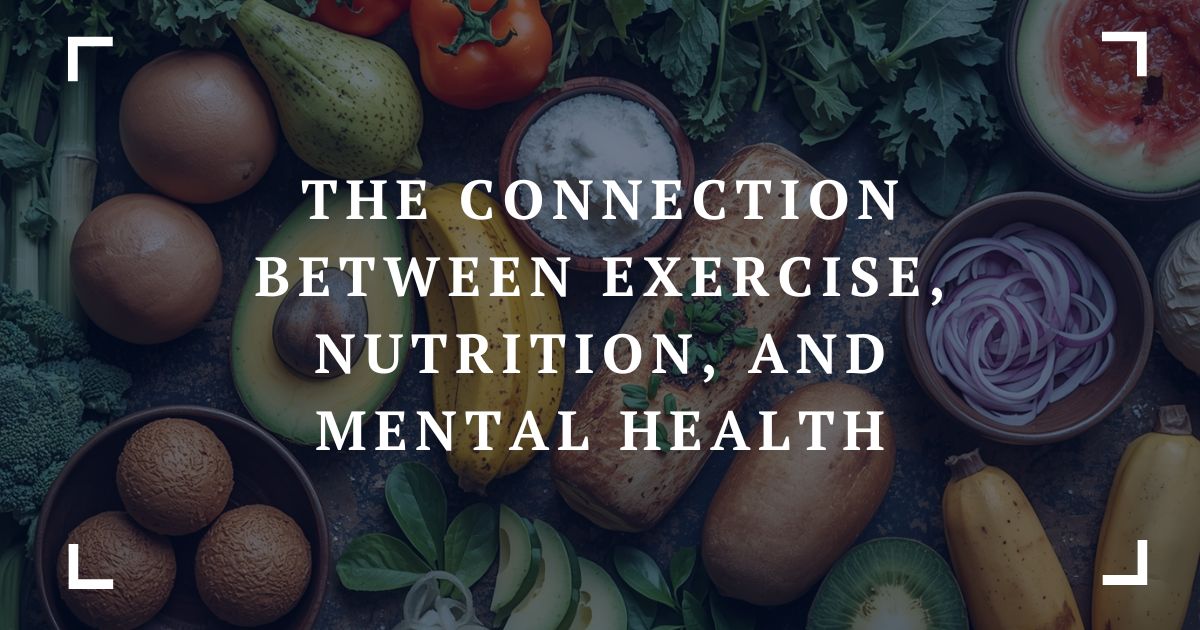There’s an undeniable connection between exercise, nutrition, and mental well-being. While there’s plenty of anecdotal evidence to point to, there’s an equal balance of scientific evidence pointing to the same conclusion: Exercise, nutrition, and mental health don’t operate within the body in isolation. Like the very life forms on earth themselves, they work together, creating a feedback loop that can either lift us up or drag us down depending on how well we maintain the balance.

How Exercise Shapes the Brain
Physical activity is one of the most reliable ways to support mental health. It doesn’t just make the heart stronger; it changes how the brain functions. When we exercise, our bodies release endorphins, that is, natural chemicals that act like built-in stress relievers. These feel-good hormones ease tension and create a sense of calm that lingers long after the workout ends.
But endorphins are only part of the story. Regular exercise increases levels of brain-derived neurotrophic factor, or BDNF, a protein that promotes the growth and survival of brain cells. This process supports learning, memory, and overall cognitive health. Research shows that people who stay physically active have sharper focus and lower rates of depression and anxiety. Even something as simple as a daily walk can move the trajectory of brain chemistry in a more positive direction.
Nutrition and Mental Stability
Just as movement fuels the mind, so does nutrition. The foods we eat provide the raw materials for neurotransmitters — the chemical messengers that regulate mood and thought. Diets rich in whole grains, lean proteins, fruits, and vegetables supply the amino acids, vitamins, and minerals the brain needs to function efficiently.
For example, omega-3 fatty acids found in fish and walnuts play a major role in building brain cell membranes and reducing inflammation, which has been linked to depression. Meanwhile, B vitamins, especially B6 and B12, help regulate mood-related neurotransmitters like serotonin and dopamine. On the flip side, when there’s too much processed food, the result is often fatigue, irritability, and mental fog.
The Gut-Brain Connection
A healthy gut supports better mental health, largely because gut bacteria help produce key neurotransmitters and influence inflammation throughout the body. Fiber-rich foods, probiotics, and fermented options like yogurt or kimchi promote gut balance, which in turn stabilizes mood and improves resilience to stress.
How Movement and Nutrition Work Together
The most powerful mental health benefits come when exercise and nutrition are combined. Physical activity increases the body’s demand for nutrients, while proper nutrition enhances recovery and energy. Someone who exercises regularly but eats poorly may experience burnout or slower progress. Conversely, a healthy diet without movement won’t fully unlock the brain’s potential for calm and clarity.
Exercise helps regulate cortisol levels, and good nutrition supports hormone balance. Together, they create a natural cycle of healing — one that doesn’t rely solely on medication or temporary fixes. In fact, some patients discover these lifestyle changes after an initial visit to urgent care for stress-related symptoms, then find that long-term improvements come from consistent exercise and dietary adjustments rather than quick treatments.
Practical Ways to Build a Routine
It doesn’t take an extreme lifestyle overhaul to see results. For most people, small, steady habits work best. Brisk walking, cycling, yoga, or swimming for 30 minutes a few times a week can be enough to lift mood and improve focus. Pair that with a diet that emphasizes balance — think colorful vegetables, lean proteins, healthy fats, and enough water — and the benefits compound over time.
It also helps to treat these changes like a personal experiment rather than a chore. Notice how your energy shifts after a week of eating cleaner meals or how your mood improves on days you get outside. Building awareness turns healthy habits into self-reinforcing ones.
Addressing Mental Health Holistically
While exercise and nutrition are powerful tools, they’re not a cure-all. There are times when professional help is necessary. Persistent anxiety, depression, or unexplained fatigue may point to deeper issues that need evaluation from a doctor or mental health specialist. The difference now is that lifestyle choices can work alongside treatment, rather than replace it.
This holistic approach — combining movement, nutrition, therapy, and sometimes medication — creates the strongest foundation for long-term mental health. It’s not about perfection but consistency. The human body thrives on routine, and the brain responds best to stability.
Lasting Wellness Through Connection
The relationship between exercise, nutrition, and mental health is one of synergy, not coincidence. Each reinforces the other, building a system of balance that supports every part of life. By choosing to move more, eat with purpose, and stay mindful of emotional well-being, people create the conditions for both physical and mental resilience.
Wellness doesn’t come from one habit. It’s the sum of many small, intentional ones. And when those habits align, the result is something most people are quietly seeking: steady energy, clear thinking, and the calm confidence that comes from taking care of the whole self.


